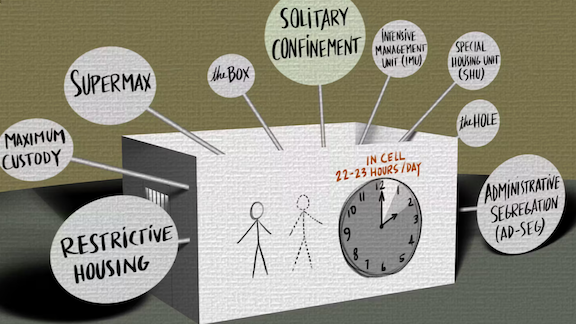Matir Asurim endorsed the US “End Solitary Confinement Act” and urges other Jewish institutions and organizations to get behind the work of ending solitary and advocating for prison justice more broadly. See statement and additional background.
Solitary Confinement in Canada
Learning from the study of the Government of Canada’s apparent attempt to end solitary confinement: The “Structured Intervention Units” in Correctional Service Canada institutions
Event Announcement: When Parliament created “Structured Intervention Units” in 2019, Correctional Service Canada (CSC) took the position that the new legislation had abolished Administrative Segregation and they no longer practiced solitary confinement. Four years later, it is clear that the term Administration Segregation is no longer part of the official toolbox for CSC, but the practice of solitary confinement is alive and well in Canada’s penitentiaries. After over four years of examining Canada’s approach to solitary confinement, it is clear that there are two separate, but related topics that can be examined. The first is straightforward. It involves the understanding of what is happening in Canada’s penitentiaries in the area normally referred to as solitary confinement. The second is more complex. It involves using the study of “Structured Intervention Units” as a tool for understanding how Correctional Service Canada operates its institutions for all prisoners.
Anthony N. Doob, professor emeritus at the Centre for Criminology and Sociolegal Studies at the University of Toronto, will explore this claim in his 2024 Distinguished Lecture of the Windsor Yearbook Access to Justice from 4 to 7 p.m. Thursday, Feb. 8, in the Don Rodzik Moot Court, Ron W. Ianni Faculty of Law Building.
Look for updates on related recording/report.
US Senate and House Updates
The US House of Representatives’ End Solitary Confinement Act gained one co-sponsor in recent weeks, bringing the total to 24 (out of 435). Track the House bill.
In late December, the Senate introduced its version of the End Solitary Confinement Act, which has five sponsors (out of 50). Track the Senate bill.
The New York City recently passed, by over-riding the mayor’s veto legislation banning solitary confinement in city jails. In 2021, the State of of New York passed legislation banning long-term use of solitary confinement in state facilities.
Municipal and state legislation has been introduced across the U.S. The Unlock the Box Campaign maintains a “Data-Tracker” with information on current and past bills.
Learn More, Take Action
The National Religious Campaign Against Torture (NRCAT) supports faith-based work across the U.S. on solitary confinement, among other issues. Here are some of their resources to use in worship and study settings.
“In keeping with our core belief that all people are made in the image of the divine and deserve to be treated as such,…”
#EndSolitary take action: nrcat.salsalabs.org/esca-2023

Interfaith Action for Human Rights supports faith-based attention to solitary confinement and other issues around incarceration, nationally and in the DC-Maryland-Virginia area. Bills are active in DC, MD, and VA at present. Check out and share their two-minute video “Reflecting on the Use of Solitary” —
image from video shows shoe box shape with stick figure and clock, “in a cell 22-23 hours a day,” and various names for Solitary Confinement: the Box, Supermax, Intensive Management Unit, Special Housing Unit, Restrictive Housing, Admin Segregation.
Unlock the Box provides works in coalition with NRCAT and provides additional tools for taking action on the federal and state levels in the U.S. For example, Unlock the Box urges reminders to President Joe Biden that he campaigned on ending solitary and has so far not fulfilled that promise.

“Dear President Biden: Keep the promises you made to the country and all those who are suffering at the hands of state-sponsored torture. End Solitary Now.”
Text over image of US flag and Pres. Biden
After the Legislation: Changing a law does not necessarily result in immediate or lasting changes in practice: see, e.g., the lawsuit filed in New York State, following passage of the HALT Solitary Act, and the work of Professor Doob and others in Canada. See also, a similar pattern regarding religious diet for incarcerated people.

